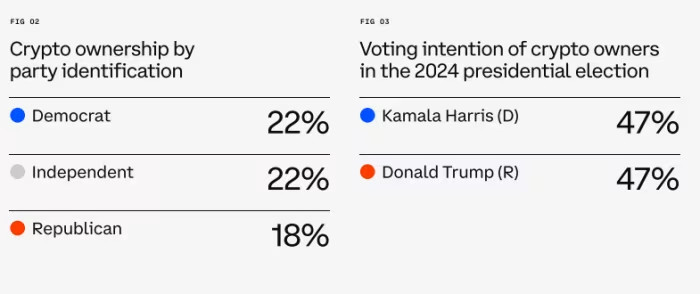The Worldwide Cryptocurrency Competition: Will America Maintain Its Lead as Trump and Harris Address Digital Finance?
In Brief
The ongoing presidential battle between Trump and Harris may significantly influence how cryptocurrency is regulated and used, as both candidates appear aware of the rising influence of crypto-savvy voters.

Digital currencies have become a pivotal issue in the political arena, especially in light of the contest between former President Donald Trump and Vice President Kamala Harris. This rivalry might shape the future landscape of cryptocurrency regulation and adoption in the United States.
While Trump has been vocal in his endorsement of crypto, Harris has taken a more cautious stance, leaving many in the industry uncertain about her position. Recent developments suggest that both candidates are becoming increasingly aware of the necessity to engage crypto voters, and the bullish trend of Bitcoin could persist regardless of the election's outcome.
The Crypto Voter Phenomenon
Recent polls from HarrisX, released by Consensys, reveal an interesting trend: a growing number of voters are prioritizing cryptocurrency policy. Nearly half of the people surveyed across the nation found politicians who support cryptocurrency appealing, with similar sentiments expressed by both Democratic and Republican voters, thus indicating a bipartisan interest. This support rises dramatically—over 80%—among cryptocurrency holders and prospective investors.
These figures show This shift illustrates how cryptocurrency is evolving from a niche concern to a mainstream political agenda. With around 30 million crypto owners in the US based on the 2020 voting figures, their collective vote could significantly influence a tight election. Both candidates seem to be adjusting their strategies to engage these voters, signaling their recognition of this demographic.

Photo: Morning Consult
Trump’s Adoption of Crypto
Donald Trump has emerged as a prominent advocate for the cryptocurrency community, making bold promises that resonate with many in this sector. His commitment to ousting SEC Chairman Gary Gensler and establishing a Bitcoin reserve has resonated well, giving him a nine-point lead among voters on this topic.
It's worth noting, however, that Trump has shifted his perspective on cryptocurrencies over time. Previously, he expressed skepticism about the value and potential risks of Bitcoin and other digital currencies. This evolution indicates that even skeptics in politics are beginning to acknowledge the critical importance of this discussion.
Harris’s Changing Position
Despite Vice President Harris not being as vocal about crypto, there are signs her campaign might be reassessing its stance. Although initially met with skepticism due to the Biden administration's apparent hostility toward digital currencies, recent hints indicate a possible softening of her position.
Reports indicate that members of the cryptocurrency sector have engaged with the Harris campaign to discuss potential crypto policies. While Harris has yet to publicly use the term 'crypto,' she has referenced 'digital assets' and 'blockchain' in prior statements.
This subtle shift in language has captured the attention of those in the crypto community. Many are optimistic that a future Harris administration could be more willing to collaborate with the industry's players. Still, some others remain wary, pointing to the lack of concrete legislative proposals and the influence of anti-crypto voices within the Democratic party.
The Opportunity for Bipartisanship
Interestingly, polling suggests there may be a chance for bipartisan cooperation in crafting crypto regulations. Voters appear to be almost evenly split regarding which party they trust more to oversee crypto matters, with a slight edge for Republicans. However, among crypto holders and most investors, Democrats tend to be viewed as more reliable in shaping policy.
The candidates are well-positioned since there isn’t a clear party division on cryptocurrency issues. By advocating for pro-crypto stances, they could potentially attract support from across the political spectrum. According to the research A notable portion of voters—especially cryptocurrency holders—are inclined to consider switching their party allegiance to support candidates who endorse cryptocurrencies.
Bitcoin’s Resilience
While the election's outcome could create short-term fluctuations in the crypto markets, many analysts are confident that Bitcoin's long-term potential remains robust, regardless of which candidate prevails in November. Steven Lubka, who leads Swan Bitcoin's private client services, forecasts Bitcoin reaching six-figure prices by 2025, showing optimism about its future.

Photo: CoinGecko
This upbeat outlook can be attributed to several factors. For one, Bitcoin has demonstrated remarkable resilience amid political uncertainty and regulatory challenges. Its success signifies a belief that its fundamental values are somewhat insulated from the political climate, particularly during times of official resistance.
Moreover, Bitcoin's increasing institutional integration, exemplified by the recent approval of spot Bitcoin ETFs in the US, has cultivated a more stable and mature market. This newfound strength not only broadens Bitcoin's investor base but also enhances its ties with traditional financial institutions, potentially shielding it from temporary political turbulence.
Consequently, ongoing global economic trends, including rising inflation and evolving monetary policy, continue to fuel interest in Bitcoin as a viable safeguard against financial instability. Regardless of who occupies the White House, these underlying factors are likely to remain influential.
Global Competitiveness
The outcome of the US presidential election will significantly shape the country's stature in the cryptocurrency landscape. Whether the US takes the lead or falls behind in this burgeoning industry will hinge on the direction set by the incoming administration, amidst a global wave of countries developing their own digital currencies and regulatory frameworks.
Proponents of a more accommodating approach towards cryptocurrencies argue that embracing digital assets could bolster the United States' efforts to maintain its financial supremacy, especially in response to challenges from China and other nations. They warn that overly stringent regulations might stifle innovation and talent, thereby diminishing the US's competitive edge on the global stage.
Conversely, critics highlight the risks of hasty implementation, raising concerns about consumer protection, financial stability, and the potential misuse of cryptocurrencies for illicit activities. Striking the right balance between fostering innovation and ensuring regulation will be one of the key challenges for the new administration.
James Davies, co-founder of Crypto Valley Exchange, emphasizes the global nature of the cryptocurrency sector, asserting that it has remained resilient in the face of significant political events on either side of the aisle. He argues that the industry needs to 'learn from traditional finance' by engaging both political parties, crafting a solid ecosystem that can thrive in varying regulatory environments. highlights Tyrone Ross, founder and president of 401 Financial, shares this perspective, estimating that the election's outcome will not drastically influence Bitcoin's performance over the next year to 18 months. According to Ross, more crucial factors determining Bitcoin's future success include its ongoing acceptance by institutions, the possibility of interest rate cuts, and its evolution as an established asset class.
Please be advised that the information on this page is not intended to be construed as legal, tax, investment, financial, or any other type of advice. It is crucial to only invest what you are able to afford to lose and to seek independent financial counsel if you have any uncertainties. For more details, we recommend reviewing the terms and conditions as well as the support pages provided by the issuer or promoter. MetaversePost is committed to delivering accurate and impartial news, but market dynamics can shift without prior notice.
Disclaimer
In line with the Trust Project guidelines Victoria is an adept writer focused on various tech topics, including Web3.0, artificial intelligence, and cryptocurrencies. Her vast experience equips her to craft engaging and thoughtful articles for a broader audience.


